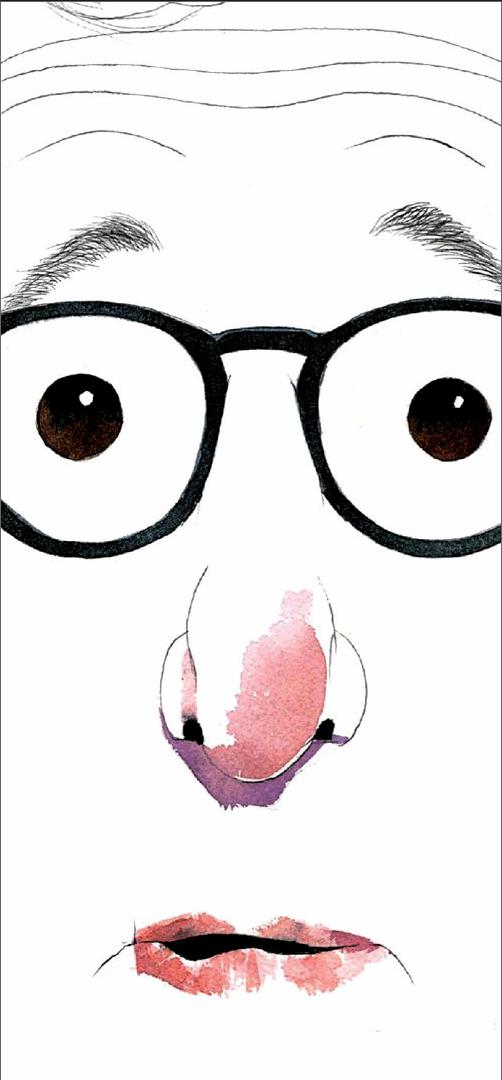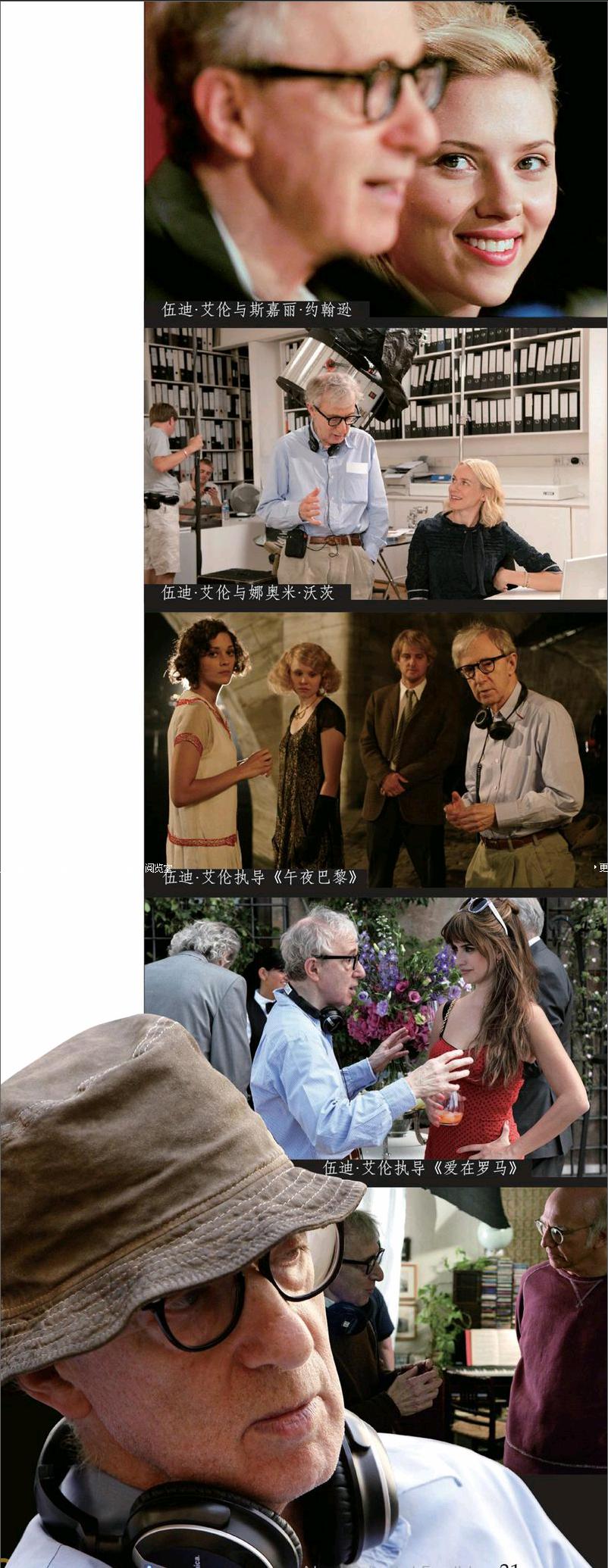The Zen of Woody Allen 伍迪·艾伦:无为而为的魔力
2014-04-09RobertB.Weide
Robert+B.+Weide


Ive often been asked to share the most surprising thing Ive learned about Woody Allen after spending two years making Woody Allen: A Documentary. My stock answer can be distilled to this: “Hes a fake.”
What I mean is that the public persona2) weve come to know as the “Woody Allen character” is just that—a character. The three Ns so often used to describe the public Allen are nebbishy3), nervous and neurotic. But the contrast between the Woody character and the “real” Allen is never more in focus than when hes on the set, directing.
Because any director must have the confidence to think on his or her feet and answer about 20 questions every minute, its hard to imagine that anyone as anxious as “classic” Allen would survive in the midst of all that chaos. But the “real” Allen does more than survive. He displays a remarkable sense of calm when at work, a confidence and security that are the antithesis4) of his public image, and both the crew and the actors take their cues from him5).
Every actor I spoke to on the London set of You Will Meet a Tall Dark Stranger, and every actor I interviewed whos worked with Allen over the years, from Diane Keaton6) to Owen Wilson7), all speak of Allen as a low-key, unflappable8) director. A veteran cinematographer once told me the only directors he knew who got exactly what they wanted acted like fascists on the set and ran over anybody who got in their way. Allen proves him wrong.
Since histrionics9) are the last thing youll find on Allens set, he even questioned whether it was worth my while10) to film him at work. “My sets are boring,” he warned me. “Nothing exciting ever happens, and I barely talk to the actors.”
Yet some sort of alchemy11) does take place, because, more often than not, the end result with Allens films can be quite remarkable. (At the age of 76, he finds himself the recipient of four more Oscar nominations for his most recent release, Midnight in Paris—an accolade12) that seems to impress everyone but Allen.) For a guy who “barely talks to the actors,” Allen seems to repeatedly bring out their best. Under his tutelage13), those actors have been nominated for 16 Academy Awards and have brought home the coveted statuettes14) six times.
So whats his secret? As the saying goes, its complicated.
The comfort level that actors find on an Allen film might play a role. Josh Brolin15) refers to the set as “very blue-collar,” meaning it lacks the self-importance, the preciousness16) of many movie sets run by less accomplished directors. For instance, Allen does not retreat to his trailer while the crew is setting up the next shot. In fact, he has no trailer, which tends to diffuse any complaints an actor may have about his or her own accommodations. Between takes17), Allen remains accessible to cast and crew as he sits in any nearby chair, talks to his assistant or his producer, reads the paper or practices his clarinet18) until hes needed again. “Its a great loafer19)s job,” he confessed to me. “Much less stressful than if I were running around delivering chicken sandwiches in a deli20) somewhere.”
It also helps that the hours are reasonable, and the actors arent overtaxed21). Allen works mainly in single master shots and doesnt bother shooting coverage from numerous angles. This alleviates the need for actors to do the same scene over and over again just so that the editor will have different shots to use within the scene. So what appears to be a stylistic choice—a minimalist22) aesthetic—is actually just Allens way of staying on schedule by eliminating a lot of repeated takes. In his usual self-deprecating23) manner, he claims he simply doesnt have the patience to seek absolute perfection. Once he gets a good take, he wants to move on, wrap at a decent hour and get to the Knicks24) game in time for the tipoff25).
This is not to say that actors who go to work for Allen are pampered26). Far from it. His actors receive no more than the guild27)-mandated minimum payment for their services. There are no inflated star salaries and no perks28)—not even a second airline ticket for spouses, let alone for an entourage29). If you prefer to live high on the hog30) while on location on an Allen picture, you could literally lose money. And some do! Yet countless actors of the highest caliber31) wait for that call from Allens casting office saying the director is interested in them for a role.
Why do so many actors want to work with Allen? It may have something to do with his Zen-like ability to direct by not directing.
Sean Penn32) tells me: “He didnt ask to see or know anything [about my character] until he rolled the camera. His feeling is that the best, complete thing hes going to get is going to come out of the actors instinct. And what he finds out on day one is whether or not he cast it well.”
The conventional wisdom about “serious” actors is that they want to dissect their character with their director, discussing everything from the characters back story to what he or she had for breakfast that morning. Allen engages in none of this “nonsense” (his word). His theory, rather, is to “hire the best actors, shut up and get out of their way.”
The actors eat it up33). Many of the performers I interviewed spoke of the sense of liberation they feel when a director is confident in their ability to come up with the goods without micro?managing their performance. Says Martin Landau34): “We never discussed the character. I never heard anyone complain about it because I think it allows a good actor a kind of freedom: ‘Heres a canvas. Paint! ”
Allen may be uninterested in babbling on35) about his “process,” but hes definitely going after a specific result, whether or not his actors realize it. Naomi Watts36) seems to have caught on to his subtle sleight of hand37). She refers to Allen as “the best actors director Ive ever worked with,” but concludes, “Theres not as much free rein as were led to believe, because he has a sense of how the scenes going to work and we need to move within those parameters.” Still, she realizes that “he wants to empower us to find it . . . and hell do it in such a gentle fashion that we dont even understand its being done.”
Larry David38) is more to the point: “This notion I hear that he doesnt direct, I mean, thats kind of ridiculous. He gets what he wants.”
Its not unusual for genuinely modest artists to oversimplify the creative process that led to their success. Allen is no exception. “Its not rocket science,” he said. “This is not quantum physics. If youre the writer of the story, you know what you want the audience to see because youve written it. Its just common sense. Its just storytelling, and you tell it.”
So much for Allen revealing the bag of tricks that has led him to become one of the most heralded39) auteurs of the past four decades. Finding him more at ease discussing practical matters, I pressed him on one that I was especially curious about: Why is he so willing to eschew his right to that private trailer on the set—something few directors are willing to live without?
On this point, he was more open.
“I dont like the bathrooms in those trailers,” he told me. “I dont know where that water comes from.”
Sometimes, the Woody character and the real Woody are indistinguishable.
人们常常问我,在耗时两年制作《记录伍迪·艾伦》这部纪录片之后,我在伍迪·艾伦身上发现的最令人意外的事情是什么。我通常的回答可以归纳为一句话:“他是个假象。”
我的意思是说,作为“伍迪·艾伦式角色”而为人们所了解的那个公众形象只不过是一个角色而已。公众眼中的艾伦最常被人们冠以三个形容词:胆小怕事、局促不安和神经兮兮。但在片场执导时,伍迪的角色和他“真人”之间的反差就最为鲜明地体现出来了。
鉴于任何一个导演都必须有才思敏捷的自信,能够应对每分钟约20次的提问,因此难以想象一个像“典型的”艾伦那样焦虑不安的人能够在这样的混乱中坚持下来。但“真实的”艾伦不仅仅坚持了下来。他在工作时还表现得极为镇静,那种自信和成竹在胸的感觉与他留给公众的印象截然相反。剧组的工作人员和演员全都听从他的指挥。
我在影片《遭遇陌生人》的伦敦片场交谈过的每一位演员以及我采访过的这些年来与艾伦共事过的每一位演员——从黛安娜·基顿到欧文·威尔逊——都说艾伦是位低调、镇定的导演。一位经验丰富的电影摄影师曾对我说,他所了解的那些能够充分实现自己意图的导演在片场无不表现得像个法西斯分子,任何妨碍他们的人都会被他们踩在脚下。艾伦则是个反例。
由于在艾伦的拍片现场根本见不到那种夸张做作的场面,他甚至怀疑我花费时间和精力去拍摄他的工作状态是否值得。“我的片场很无聊,”他警告我说,“从来不会发生什么令人激动的事,而且我几乎不跟演员们说话。”
但艾伦的片场的确会产生某种奇妙的魔力,因为多数情况下他的影片的最终表现都会相当出色。(在76岁时,他凭借最新发布的作品《午夜巴黎》又获得了四项奥斯卡奖提名——这样的荣誉似乎令所有人赞叹,只有艾伦本人除外。)作为一个“几乎不跟演员们说话”的导演,艾伦似乎能一再激发出演员的最佳状态。在他的指导下,那些演员共16次获得学院奖的提名,并6次将人人垂涎的小金人收入囊中。
那么他的秘诀是什么?正如人们常说的,这很复杂。
演员们在拍摄艾伦的影片时感到很舒适,这也许是其中的一个因素。乔希·布罗林形容艾伦的片场“非常平民化”,意思是这里看不到许多成就不及艾伦的导演的片场里充斥的那种傲慢和做作。比如,当工作人员为下一段拍摄作准备时,艾伦不会躲到自己的拖车里。事实上,他没有拖车。这也往往会消除演员们对自己设施待遇方面的不满。拍摄间隙,演员和工作人员仍然可以随时找到艾伦,因为他就坐在附近随便一张椅子上,与助理或制片人交谈,读报,或是练习单簧管,直到拍摄再次需要他为止。“这是游手好闲者的理想工作,”他向我坦承,“比在某个地方的熟食店东奔西跑地送鸡肉三明治轻松多了。”
另一个有帮助的因素是工作时间安排合理,演员们的工作强度不会过大。艾伦主要使用单一主镜头拍摄,不会费心地从多个角度拍摄画面。这就使演员们无需反复演出同一场戏,仅仅为了让剪辑师能在同一个场景中使用不同角度的镜头。这表面上看是艾伦选择了极简主义美学的电影风格,实际上他只是通过省去大量重复拍摄这种方式来保证拍摄进度。他以一贯过分谦逊的态度称自己只是没有那份耐心去追求绝对的完美。一旦拍到不错的镜头,他就想继续往下拍,然后适时收工,及时赶去看尼克斯队比赛开场的中圈跳球。
这并不是说为艾伦工作的演员都被宠坏了。事实远非如此。演员出演他的影片只能拿到演员公会规定的最低片酬:既没有抬高的明星薪酬,也没有特殊待遇——甚至不会多提供一张机票给演员的配偶,更不用说其他随行人员了。如果你想在艾伦影片的外景地奢侈地享受,那你可能真的会赔钱。真有人赔钱!然而,无数最优秀的演员都在期待艾伦的选角办公室打来电话,说导演有兴趣找他们出演一个角色。
为什么有这么多的演员想与艾伦合作?也许这和他富有禅意的导演能力有关,那就是无为而为。
西恩·潘告诉我:“在正式拍摄前,他没有要求看或是了解任何[与我的角色有关的]事。他的想法是,他所能拍到的最完美的表演将来自于演员的本能。他在开拍第一天要弄清楚的是角色选派是否恰当。”
通常人们对于“认真的”演员的概念是他们想要和导演一起剖析自己的角色,从角色的身世背景到他(她)那天早餐吃了什么,巨细无遗地探讨。艾伦可不做这种“蠢事”(他的原话)。相反,他的观点是“请最好的演员,然后闭嘴,不要妨碍他们”。
演员们对此很是欣赏。我采访的许多演员都谈到,当导演相信演员无需过细的指导就能表现出合乎要求的东西时,他们能感受到一种自由。马丁·兰道说:“我们从来不讨论角色。我从没听到任何人对此有怨言,因为我认为这给了好演员某种自由发挥的余地:‘这儿有块画布,尽情画吧!”
艾伦也许无意赘述他的“过程”,但他确实是在追求某种特定的结果,无论演员们是否意识到了这一点。娜奥米·沃茨似乎对他这种巧妙的手法有所参悟。她称艾伦为“我合作过的最会引导演员的导演”,但她也总结说:“我们的自由度并没有他让我们以为的那么大,因为对于某个场景应该怎么表现,他有自己的认识,我们得在那个范围之内进行表演。”尽管如此,她也意识到“他想让我们自己找到他所要的效果……他采取的方式非常温和,我们甚至都不会察觉到他在那么做”。
拉里·戴维的话更简明扼要:“我听到有人说他不导戏,我觉得这种说法挺可笑的。他能得到自己想要的结果。”
真正谦逊的艺术家常常对引领自己走向成功的创作过程轻描淡写,艾伦也不例外。“这不是什么高深的学问,”他说,“这不是量子力学。如果你是故事的作者,你就会知道自己希望观众看到什么,因为故事是你写的。这不过是常识,只是讲故事而已,你讲就好了。”
对于使他成功跻身过去40年间最受欢迎电影导演之列的锦囊妙计,艾伦只透露了这么多。我发现他在谈到实际事物时较为放松,于是向他追问了一个令我感到特别好奇的问题:他为什么愿意放弃在片场使用私人拖车的权利?很少有导演愿意这样做。
对于这个问题,他回答得更坦率。
“我不喜欢那些拖车里的洗手间,”他对我说,“我不知道里面的水是从哪儿来的。”
有些时候,伍迪的角色和他本人还真是难以区分。
1. Zen [zen] n. [宗]禅宗
2. persona [p?(r)?s??n?] n. 表面形象
3. nebbishy [?neb??i] adj. 〈口〉胆小怕事的
4. antithesis [?n?t?θ?s?s] n. 对立面
5. take ones cues from someone:照某人的样子做,听某人的劝告
6. Diane Keaton:黛安娜·基顿(1946~),美国电影演员、导演和制作人,曾出演伍迪·艾伦执导的影片《安妮·霍尔》(Annie Hall)并获得奥斯卡最佳女主角奖。
7. Owen Wilson:欧文·威尔逊(1968~),美国演员、电影剧作家,曾出演伍迪·艾伦执导的影片《午夜巴黎》(Midnight in Paris)并获得金球奖最佳音乐及喜剧类电影男主角奖提名。
8. unflappable [?n?fl?p?b(?)l] adj. 〈口〉不易激动的;镇定的
9. histrionics [?h?stri??n?ks] n. 装腔作势,做作的言行
10. worth ones while:值得某人(花时间、精力等)的
11. alchemy [??lk?mi] n. (改变事物的)魔力;(事物的)神秘变化
12. accolade [??k?le?d] n. 荣誉;赞美
13. tutelage [?tju?t(?)l?d?] n. 指导,教导
14. statuette [?st?t?u?et] n. 小雕像
15. Josh Brolin:乔希·布罗林(1968~),美国演员,曾出演伍迪·艾伦执导的影片《遭遇陌生人》(You Will Meet a Tall Dark Stranger)。
16. preciousness [?pre??sn?s] n. 过分讲究,做作
17. take [te?k] n. 一次拍摄的电影(或电视)镜头
18. clarinet [?kl?r??net] n. [音]单簧管
19. loafer [?l??f?(r)] n. 游手好闲者,闲荡者
20. deli [?deli] n. 〈美口〉熟食店,等于delicatessen。
21. overtax [???v?(r)?t?ks] vt. 使负担过重,使工作过度
22. minimalist [?m?n?m?l?st] adj. 极简抽象派艺术的
23. self-deprecating [?self?depr??ke?t??] adj. 自我贬低的;过分谦虚的
24. Knicks:即纽约尼克斯队(New York Knicks),美国国家篮球协会(NBA)的创始球队之一,位于纽约市。
25. tipoff [?t?p?f] n. [篮] (比赛开始时的)中圈跳球
26. pamper [?p?mp?(r)] vt. 给……以过度的关怀和照料;纵容
27. guild [ɡ?ld] n. 协会,同业公会
28. perk [p??(r)k] n. 〈口〉特殊待遇;额外所得
29. entourage [??nt??rɑ??] n. [总称] (全体)随行人员
30. high on the hog:〈美口〉奢侈地,挥霍地
31. caliber [?k?l?b?(r)] n. 水准,质量;能力
32. Sean Penn:西恩·潘(1960~),美国演员,曾出演伍迪·艾伦执导的影片《甜蜜与卑微》(Sweet and Lowdown)并获奥斯卡最佳男主角奖提名。
33. eat up:对……极为欣赏,为……欢呼
34. Martin Landau:马丁·兰道(1928~),美国演员,曾出演伍迪·艾伦执导的影片《爱与罪》(Crimes and Misdemeanors)并获奥斯卡最佳男配角奖提名。
35. babble on:喋喋不休地谈论
36. Naomi Watts:娜奥米·沃茨(1968~),澳大利亚演员,曾出演伍迪·艾伦执导的影片《遭遇陌生人》(You Will Meet a Tall Dark Stranger)。
37. sleight of hand:把戏,花招
38. Larry David:拉里·戴维(1947~),美国演员、编剧、电视制作人,曾出演伍迪·艾伦执导的《怎样都行》(Whatever Works)等影片。
39. herald [?her?ld] vt. 为……欢呼,欢迎
